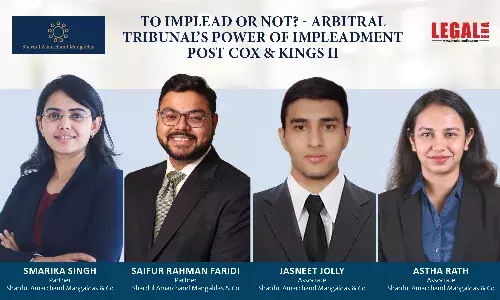Interpretation of ‘Prima Facie’ case of fraud and Corruption for an unconditional stay of arbitral award under Section 36(3) of the Arbitration and Conciliation Act, 1996
The sub-section (2) of Section 36 of the Arbitration and Conciliation Act, 1996 (“Act”) provides that the filing of an;

INTERPRETATION OF ‘PRIMA FACIE’ CASE OF FRAUD AND CORRUPTION FOR AN UNCONDITIONAL STAY OF ARBITRAL AWARD UNDER SECTION 36(3) OF THE ARBITRATION AND CONCILIATION ACT, 1996 A finding of a prima facie case of fraud and corruption contemplates a drastic step of unconditional stay of award until disposal of objections under Section 34 of the Act.The sub-section (2) of Section 36 of...
INTERPRETATION OF ‘PRIMA FACIE’ CASE OF FRAUD AND CORRUPTION FOR AN UNCONDITIONAL STAY OF ARBITRAL AWARD UNDER SECTION 36(3) OF THE ARBITRATION AND CONCILIATION ACT, 1996
A finding of a prima facie case of fraud and corruption contemplates a drastic step of unconditional stay of award until disposal of objections under Section 34 of the Act.
The sub-section (2) of Section 36 of the Arbitration and Conciliation Act, 1996 (“Act”) provides that the filing of an application seeking to set aside the arbitral award shall not by itself render the award unenforceable. Rather, the Court is empowered to grant a stay of the operation of the arbitral award upon the filing of an application for the same under Section 36(2) of the Act. This interplay of Section 34 and Section 36 of the Act provides the Court with the power to make interim order during the pendency of the disposal of the objections under Section 34 of the Act. This is especially significant given that the term “Court” occurring in Section 36 is not meant to be the Court as defined within the meaning of Section 2(1)(e) of the Act1. There is however one exception to the general rule towards the grant of stay of operation of an arbitral award under Sub-section (2) of Section 36 of the Act. Proviso to Section 36(3) of the Act provides that Court shall stay the award unconditionally pending disposal of the challenge under Section 34 of the Act if a prima facie case is made out that the arbitration agreement or contract which is the basis of the award or the making of the award was induced or affected by fraud or corruption. However, the contours of what constitutes a ‘Prima facie case’ are not made clear by the wording of the proviso to Sub-section (3) of Section 36 of the Act.
In a recent judgment passed by Hon’ble Delhi High Court in Mahanagar Telephone Nigam Limited v. Canara Bank and Anrs2, (“MTNL v. Canara Bank”), the Court was confronted with an allegation made by Petitioner of fraud induced by the Respondent in the contract agreement. The said allegations were made by relying on the observations made by multiple Commissions/Committee appointed by Statutory bodies such as RBI (Reserve Bank of India). Hon’ble Court ruled that MTNL has not been able to demonstrate prima facie that the contract, which is the basis of the award, was induced by fraud or corruption. The Court ruled that contemporaneous correspondence does not establish a case of fraud or that MTNL was not aware of the nature of the transactions.
This Article analyzes the approach adopted by the Hon’ble Court in determining whether a prima facie case of fraud or corruption is made out for a grant of unconditional stay under Section 36 of the Act. Part I of the Article briefly summarizes the factual background, while Part II deals with the analysis of the ruling laid down by the Court.
I. Factual Background
The parties to the dispute i.e., MTNL (“Petitioner”) and CanBank Financial Services Ltd (Canfina, hereinafter referred to “Respondent No. 2”) entered into a Memorandum of Understanding under which Letters of Allotment were to be issued and Respondent No.2 was to subscribe to bonds issued by Petitioner. The proceeds of the bond were to be invested with Respondent No. 2. Accordingly, LOAs to the tune of Rs. 200 Crores were issued by Petitioner to Respondent No.2. Subsequently, Petitioner took a separate loan of Rs. 200 Crore from the Industrial Development Bank of India (“IDBI”) which was assigned to Respondent No.2 to be paid directly from the proceeds invested with Respondent No.2 by Petitioner. However, it was the case of the Petitioner that the transaction was affected by a “wide-ranging securities scam” in the stock market during April-May 1992.
Subsequently, Canara Bank (“Respondent No. 1”) which was the holding company of Respondent No. 2, took a transfer to the LOAs from Respondent No. 2 and sought registration of the bonds and payment of interest by MTNL. The same was disputed by the Petitioner. The Petitioner cancelled the LoAs and the parties were referred to arbitration by the order of the Court under writ jurisdiction. The arbitral award dated 03.03.2022 (“Impugned award”) allowed the claims of the Bank and granted a declaration that the cancellation of the bonds by MTNL was illegal. MTNL was consequently directed to refund a sum of Rs.160 Crore to the Bank with interest @ 6% per annum from 20.10.1993 until realization. The Petitioner filed an application for the stay of the impugned award.
II. Ruling of the Hon’ble Court
The proviso to Sub-section (3) of Section 36 of the Act provides that the Court is required to be satisfied with a Prima Facie case that either the arbitration agreement or the contract which is the basis of the award was induced or effected by fraud or corruption or that the making of the award was induced or effected by fraud or corruption. A prima facie case is said to be established if the evidence which is led in support of the same were believed. The test of whether a prima facie case has been established is whether on the basis of the evidence led it was possible to arrive at the conclusion in question. However, mere allegations regarding inducement are not sufficient; such inducement must be based on some fraud practised or corruption made3. As sub-section (3) of 36 of the Act refers to only a prima facie case, it is not required on the part of the petitioner to provide his case to the hilt4.
In MTNL v. Canara Bank, the Petitioner had relied on observations made by the Jankiraman Committee, R. Nanjappa Committee, and the Joint Parliamentary Committee all of which had enquired into the circumstances and allegations of a scam in the Financial Market. Petitioner had submitted that no request was made to the Respondent No. 2 to invest in the market securities on behalf of Petitioner. Petitioner relied on aforementioned committee reports to allege that the details of open contracts in Government loans and PSU bonds did not appear to be available in the records of Respondent No. 2 and that it was difficult to verify the existence of these open contracts. Petitioner also relied on JPC Reports which observed that the transactions involving PSU bonds were “off Balance-sheet transactions.” It was brought to the notice of the Court that the Joint Parliamentary Committee had observed that Respondent No. 2 had been violating RBI guidelines with regard to Portfolio Management Services.
The Respondent had on the other hand relied on the bank statement of Respondent No. 2 to submit that there were indeed cross-transactions of Rs. 200 Crores each on the same day recorded in the books to support the conclusion that the subscription to the bonds and investment through portfolio Management Services were two separate transactions. Respondent also submitted contemporaneous correspondence to show that intention of the parties was for securities to be held by Respondent No. 2 on behalf of Petitioner.
It must be noted that the Learned Arbitrator in his impugned award had decided that Respondent No.1 and Respondent No. 2 had not been indicted for fraud vis-à-vis subscription to the bond and that the securities were held by Respondent No. 2 on behalf of Petitioner.
The Hon’ble Court had restricted itself from examining the question of fraud or corruption in the subject transaction in detail. This is because the Court under Section 36 of the Act is only called upon to take a prima facie view. Resultantly, any determination, adverse or otherwise, does not foreclose the right of the parties to raise objections under Section 34 of the Act for the setting aside of the award. In view of the abovesaid, Hon’ble Court had ruled against a finding of a prima facie case of fraud or corruption in the contract which formed the basis of the award. Consequently, the Hon’ble Court ruled against the grant of unconditional stay of the award. The Hon’ble Court ruled that despite the existence of observations that point out the irregularities in the transactions made by Respondent No. 2, the contemporaneous correspondence does not establish a case of fraud. In arriving at this decision, the Court was guided by the correspondence relied upon by the Learned Arbitrator to decide that the transactions were not vitiated by fraud.
Once the Court had determined that no prima facie case of fraud and/or corruption exists for a stay of operation of the arbitral award, the Hon’ble Court directed that the enforcement of the impugned award will be stayed subject to MTNL depositing Rs. 160 Crores and interest thereupon at the awarded rate of 6% per annum from 20.10.1993 until 31.03.2023.
III. Conclusion
The ruling of the Hon’ble Delhi High Court in MTNL vs. Canara Bank provides much-needed clarity on the ambit of interference by the Court contemplated under proviso to Section 36(3) of the Act insofar as determination of prima facie case of fraud or corruption is concerned. The Hon’ble Court refused to interfere with the impugned award insofar as the impugned award distinguished the subscription of bond from the investment with the Portfolio Management Services of Respondent No. 2. The observations of the Government Appointed Committees though relevant as far as compliance with Portfolio Management Services of Respondent No. 2 was not found to be the basis for prima facie case of fraud or corruption insofar as subscription of the bond between Respondent No. 1 and the Petitioner. The Court had also relied on contemporaneous correspondence on record in ruling against the finding of prima facie case under Section 36 of the Act. A finding of a prima facie case of fraud and corruption contemplates a drastic step of unconditional stay of award until disposal of objections under Section 34 of the Act.
2. Mahanager Telephone Nigam Limited v. Canara Bank and Anr, O.M.P. (COMM) 312/2022 dated 28.02.2023, 2023 SCC OnLine Del 1172
3. State of Maharashtra v. Jaykumar Fulchand Ajmera, MANU/MH/2223/2021.
4. Martin Burn Ltd. v. R.N. Banerjee, AIR 1958 SC 79: 1958 SCR 514: (1958) 1 LLJ 247





